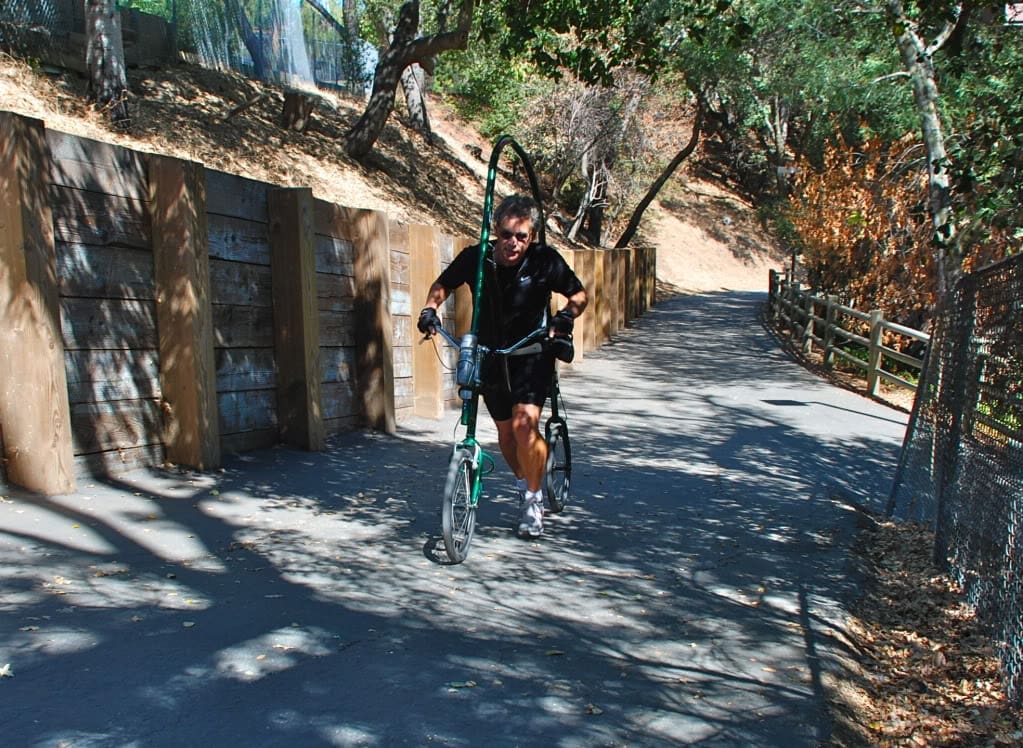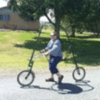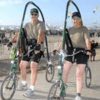While not exactly like running, GlideCyclists experience a sensation like running and refer to this activity as either “GlideCycling”, “Gliding” or “running on their GlideCycle”.
As with other sports, practice and regular training will help you to enjoy your GlideCycle experiences and achieve personal goals. Although many new GlideCyclists will report that learning to operate a GlideCycle™ is simple, keep in mind that when learning a new sport, muscular adaptations and skill development generally take weeks or months to occur. In fact, GlideCyclists have noticed strength, speed and skill development continuing well over a year from the first experience. Many never imagined what they would accomplish on the GlideCycle:
- running again, especially longer distances and faster speeds
- climbing hills and mountains
- running trails or beaches
The learning progression for GlideCyclists is similar to, yet often simpler, than other outdoor sports. For instance, mountain bikers must practice climbing as well as descending many times before they can ride without stopping for rests or to avoid obstacles. And how many times must skiers and snow-boarders fall before finally learning to carve a turn or gaining confidence in their level of control? Everyone from bikers to skiers to equestrians must also fuss with proper setup and adapt to seat, boot or saddle discomfort. One thing is for certain in all sports: The more skilled you become, the more fun the experience. Thankfully, GlideCycling can be enjoyed by individuals at various fitness and skill levels almost immediately. With a little practice, the GlideCycle will become a flowing extension of your body and well worth every minute of the learning process.
The following stages have repeatedly been observed with new GlideCyclists
STAGE 1
In just minutes to a few hours, a new GlideCyclist can easily enjoy level ground or small slopes and turn competently. A deconditioned person will feel aerobically challenged at this stage whereas a well-conditioned athlete will feel a mild to moderate aerobic challenge. Good options for practicing include local tracks, gentle bicycle paths and large empty parking lots. Most new GlideCyclists will benefit from a few weeks of practice on mild or flat terrain in order to develop a strong, smooth running style and allow muscles to adapt and strengthen for this new activity. On flat ground you will feel the hamstring, glut and even lower back muscles working hard.
Beginners often feel arms are working hard. Stop and use only the tips of thumb and forefinger to hold the handle bars. Now, engage your core and lift your back straight. This illustrates how the core muscles can support you once trained. Using full grip again, run and use your core to ease up on the arms. Eventually, you will run with one hand and a light grip with the other. Never run with both hands off.
Last, it is very helpful but advanced to practice steering with one hand while walking or gliding slowly under control and gradually get used to one handed steering at moderate speeds. This will allow running with one hand free while the other hand is used for strap adjustments. Also, it is important to practice strap adjustments while standing still until they feel simple to do with one hand. Not all GlideCyclists will need to make one handed strap adjustments but most will prefer because it can be done without breaking stride.
STAGE 2
At this stage, GlideCyclists start to feel everything come together on level ground. You will consistently enjoy the easy, rhythmic strides and settle into a “sweet seat set-up”. Like most learned activities, it feels easy once you get it and with practice, your body rapidly develops muscle memory. This is also a good time to experiment with building speed. Try sprinting and you will find that once the glider is moving faster, it takes little more effort to go fast, 8 to 12 mph than to run slower, 4 to 7 mph.
Once a new GlideCyclist is able to run smoothly for at least a few miles, with a relaxed, upright posture, and can make strap adjustments fairly easily, it is time to work on hill climbing. We recommend finding a medium grade (not too steep at first), approximately ¼ mile paved incline…the steeper the better. 
technique: Lower the front bottom strap for any hill, and both front straps for steep hills. The lower strap is always more loose on all hills or mountains. The general idea is to lean into the hill like you were pushing a car stuck in the mud. Watch the hill climb training video above.
Practice setting up straps to run up the hill and coast down. Repeat as many times as you can. It is a great workout to go up and ride down…no pain descending!! Try this two times per week until it becomes much easier. It shouldn’t take long for your hill climbing technique and confidence to significantly improve. Be sure that when running uphill, you are actually gliding vs. walking/bouncing uphill. When you glide uphill correctly with most of your weight in the saddle assembly vs. your feet, it feels smooth and often fast. If you are not certain, watch the training videos, have someone watch you or contact an experienced trainer with a video of you climbing. You will feel the quad and calf muscles working hard in climbing.
Note at this stage, you may still find yourself fussing or experimenting with straps to obtain the right leg height and tilt for climbing and may not feel that every strap adjustment is as smooth as you would like. Do not worry as this is normal. Practice will improve your adjustments and make GlideCycling even more fun.
STAGE 3
- Now strap adjustments should easier and quicker.
- One-handed running skills are much better.
- Muscles have adapted and strengthened so that getting into a good strong rhythm for aerobic exercise is becoming easy. More fit individuals are able to reach the higher anaerobic zones and speeds needed for interval training.
- Hamstring and hip muscles have become more flexible allowing long and powerful strides.
- Adjusting the seat each time you run has become simpler and usually takes very little time, even seconds.
- Now your options have greatly increased because of your ability to run hills and you feel ready to try longer runs and bigger hills.
- This is a fun time to try running on trails and hard packed sand on beaches.
STAGE 4
Over the next year you continue to notice improvements in strength and fitness on the GlideCycle and it becomes more fun all the time.
Hills that used to feel challenging are much easier and you don’t have to adjust straps as often due to improved leg strength. What a thrill to feel strong, healthy, fit and energized and still feel improvements in this life long sport. You have so many fun runs to look forward to and cannot imagine life without your GlideCycle.
You want to share this experience with so many others.
A GLIDECYCLIST’S LEARNING EXPERIENCE
My learning experience was typical. I was a well conditioned athlete but suffered from chronic knee and hip pain from bicycling and other activities and a serious back injury limiting my functional ability, especially lifting. This is a familiar story for many long-time athletes.
I learned the basics of GlideCycling in 15 minutes and really enjoyed some nice early runs. For the first few weeks I spent a lot of time learning and experimenting with seat set up and strap adjustments. It reminded me of all the tinkering I had to do with new bicycles where the seat height, tilt and forward/backward position had to be readjusted many times until comfortable as did my cleat positions, handlebar height etc…
There were more similarities between my first GlideCycle and mountain bike experiences. I was learning a new sport once again, requiring different muscle groups and a new set of skills. It brought flashbacks of my first experience Mountain Biking up a 4 mile, approximately 1 hour climb, which required 22 rest stops the very first attempt and wasn’t exactly what I would call a fun experience. For some reason, I decided to attempt the same climb weeks later with 12 rest breaks, then 4, and was very excited several weeks later, when I could complete the climb with only 2 rest stops in 50 minutes. Finally, the climb started to become fun and I was addicted to mountain biking. For the next 22 years, I was able to complete the same climb without any rest stops but never would have believed it was possible that very first day. It also took a year to become skilled enough to ride entire trails downhill. Similarly, in GlideCycling, I found the more skill I developed, the more fun I had as the GlideCycle became a flowing extension of my body (my Avatar).
Somewhere, after 4-6 weeks of GlideCycling 3 to 5 times per week, everything started to come together. Seat and strap adjustments became easy while my running stride was smooth, powerful and fast. Within 6 weeks and a little practice, hill climbing improved. Who could believe that a 22 mile run would take me under 2 ½ hours and feel energizing? Or that I could climb 8-10 miles up a steep mountain road (4500 foot elevation gain) and enjoy the workout? With my new found freedom, I also began running on trails and beaches again. What a great feeling.
Even today, the more I GlideCycle, the stronger and more fit I feel, especially in the legs, core, back and postural muscles. The usual post-exercise pain and suffering just doesn’t happen. Years of debilitating, chronic knee and hip inflammation were virtually gone after my first 2,000 miles of unweighted exercise on the GlideCycle™. Three years of back weakness and discomfort has greatly improved enough to notice increases in pain free motion and lifting. Thanks to the GlideCycle I am back again – no more downward spiral. Oh, and anyone who wants to keep up with me better get a GlideCycle™.






